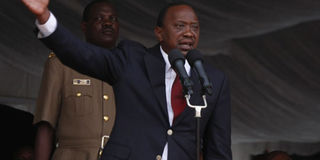President Uhuru Kenyatta directs Treasury to clarify VAT law

President Uhuru Kenyatta at a past function. He has directed the Treasury to publish regulations clarifying the VAT law. PHOTO/FILE
What you need to know:
- Objective of implementing VAT law was to simplify the tax regime, cushion the poor and increase revenues
- Basic commodities like milk, flour and bread are exempted from VAT
President Uhuru Kenyatta on Tuesday said he has directed Treasury to publish regulations clarifying the Value Added Tax law to prevent unscrupulous traders from taking advantage of Kenyans.
The President said there have been questions on how the VAT law has been interpreted as basic commodities are exempted.
“Basic commodities like milk, flour and bread are exempted from VAT. Clarity will ensure we avoid the spectre of the unscrupulous taking advantage of ordinary citizens and overcharging for goods,” he said.
He said the objective of implementing the law was to simplify the tax regime, cushion the poor and increase revenues.
President Kenyatta spoke at the opening of a conference on Kenya’s economic success, prospects and challenges at a Nairobi hotel.
The conference was convened by the National Treasury, Central Bank of Kenya and the International Monetary Fund (IMF).
At the same President Kenyatta has said his administration will trigger an industrial revolution that will propel Kenya to a middle income status by 2030.
He said as a starting point, concentration will be on infrastructure where the road and rail networks will be expanded and power supply increased.
“The Kenya Vision 2030 has brought us to the stage where we are laying a robust national economic foundation. This entails the implementation of programmes in infrastructure, energy, security, science, technology and innovation,” he said.
The President said Government has increased bituminized road by 13 percent, which represents 1,110 kilometres, and intends to complete a network of international trunk roads to link Kenya with her neighbours Tanzania, Uganda, Ethiopia and South Sudan.
He said Kenya is assembling resources to build a standard gauge railway from Mombasa to Kigali through Uganda.
“All the governments involved have assigned this project as top priority,” the Head of State said.
LOW FOOD COST
He said other priority sectors including agriculture, tourism, trade, manufacturing, ICT and, starting this year, oil and other mineral resources have been scaled up.
He indicated that the agricultural sector will be transformed by reducing dependence on rain-fed farming, expanding and expanding the area under irrigation.
This, the President said, will lower food costs and promote food security by making farming a commercial activity.
“Some 1.2 million acres at the Galana Irrigation Scheme will be our flagship project for improving food security and increasing production of maize and sugar,” the President said.
He said value addition in agribusiness, irrigation and the stepping up of food security initiatives will create 3 million jobs over the next three years.
As part of projecting Kenya’s position as the region's technology hub, the President said Government is set to build the Silicon Savana, Africa's most ambitious techno-city at Konza.
“We want to make Kenya Africa's gateway, manufacturing and technology hub and a home to millions of entrepreneurs,” said the President.
IMF Africa Director Antoinette Sayeh commended Kenya’s home-grown economic reforms which have set the country as example worth being emulated in Africa.
She said IMF will continue supporting Kenya in its efforts to grow the economy and improve the lives of citizens.




